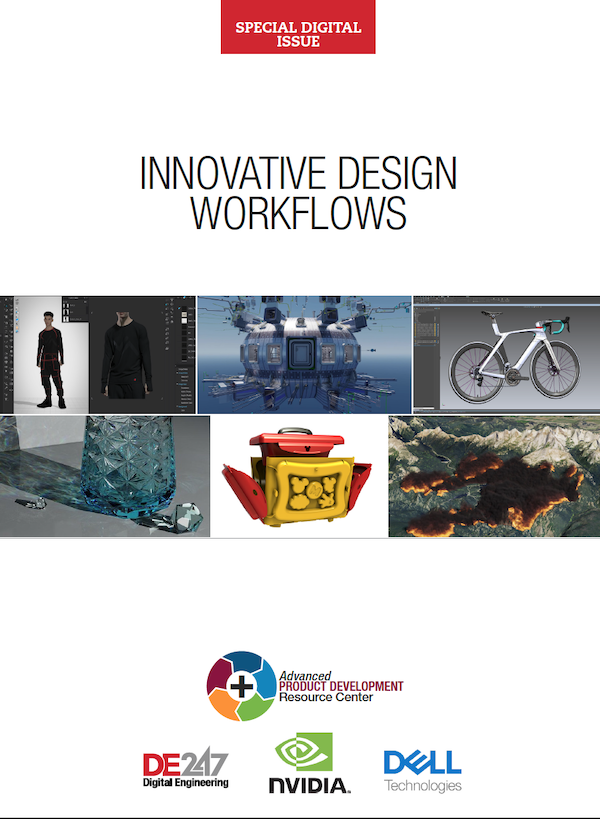Latest News
February 19, 2010
By DE Editors
Dassault Systèmes has launched Release 20 of its collaborative V5 PLM portfolio, including CATIA, ENOVIA, SIMULIA, and DELMIA. V5R20 includes enhancements to DS’ ENOVIA SmarTeam multi-CAD collaboration software, integration of SIMULIA’s nonlinear and thermal realistic simulation capabilities into the V5 platform, as well as composites design and simulation capabilities in the CATIA and SIMULIA brand portfolios. V5R20 also features enhancements across the portfolio, including digital manufacturing, furthering support for production deployments, and overall usability.
V5’s openness is advanced in Release 20 with updated multi-CAD integrations and a new 3D viewer available directly within ENOVIA SmarTeam. In addition, V5R20 introduces a new product, CATIA Extended STEP Interface. It enhances large assembly archiving with nested assembly support. In V5R20’s update second quarter 2010 update, CATIA Extended STEP Interface will feature support for composites design attributes, and functional tolerancing and annotation data. The second quarter 2010 update to the entire V5 portfolio will also include support for Windows 7.
CATIA V5R20 serves customers in production and support business processes. CATIA Composites solutions:
- Enables collaboration between engineering and manufacturing thanks to full generative manufacturing part creation taking into account engineering requirements.
- Offers concurrent working on the same composite part, later merging and synchronizing separately designed stacks into a single manufactured composite part.
- Has a new grid-based design methodology that automatically generates plies by taking each cell’s composite specifications defined during simulation and applying composite design best practices.
SIMULIA Extended Analysis allows V5 users, including designers, to simulate real-world nonlinear or thermal behavior of their products with Abaqus FEA technology. It includes:
- Nonlinear analysis capabilities that allow users to simulate large displacements, complex contact interactions, and highly deformable materials such as rubber and plastic.
- Integrated thermal analysis functionality that enables V5 users to improve product performance by analyzing the effect of temperature distribution in parts or assemblies, such as electronic circuit boards, automotive engines, or consumer appliances such as stove-tops.
- Rule Based Meshing enables V5 analysis users to capture their knowledge and define meshing rules to automate the creation of surface meshes. Other V5 users can then select their target simulation application such as noise and vibration, durability, or crash, and have a mesh created automatically, accounting for element quality and geometric features such as holes and fillets.
- V5 analysis capabilities that enable users to simulate the structural integrity of composite layups defined in CATIA Composite Design (CPD). Improvements in simulation post-processing capabilities enable ply-per-ply post-processing of analysis results using ply names.
V5R20 digital manufacturing and production features include:
- An enhanced DELMIA Work Instruction Composer that enables configured shop floor instruction authoring that has been enhanced to support, advanced synchronization of work instruction changes to design changes, multi-view support for operations and support for data collection, buy off and change notification operations.
- New finishing and high-speed milling operations to reduce machining programming time, tool path execution time, and tool wear.
- V5R20’s painting package, developed in close collaboration with CENIT, extends robotics programming, simulation, and offline programming of DELMIA solutions in the paint domain.
V5R20 collaborative features include:
- Enhanced CAD integrations support SolidWorks 2009, Solid Edge v21, Inventor 2010, and AutoCAD/Autodesk Mechanical 2010.
- Real-time production environment monitoring that accelerates deployment of ENOVIA SmarTeam implementations and optimizes maintenance and support.
- Improved configuration and change management in ENOVIA VPM.
For more information, visit Dassault Systemes.
Sources: Press materials received from the company and additional information gleaned from the company’s website.
Subscribe to our FREE magazine, FREE email newsletters or both!
Latest News
About the Author
DE’s editors contribute news and new product announcements to Digital Engineering.
Press releases may be sent to them via [email protected].






